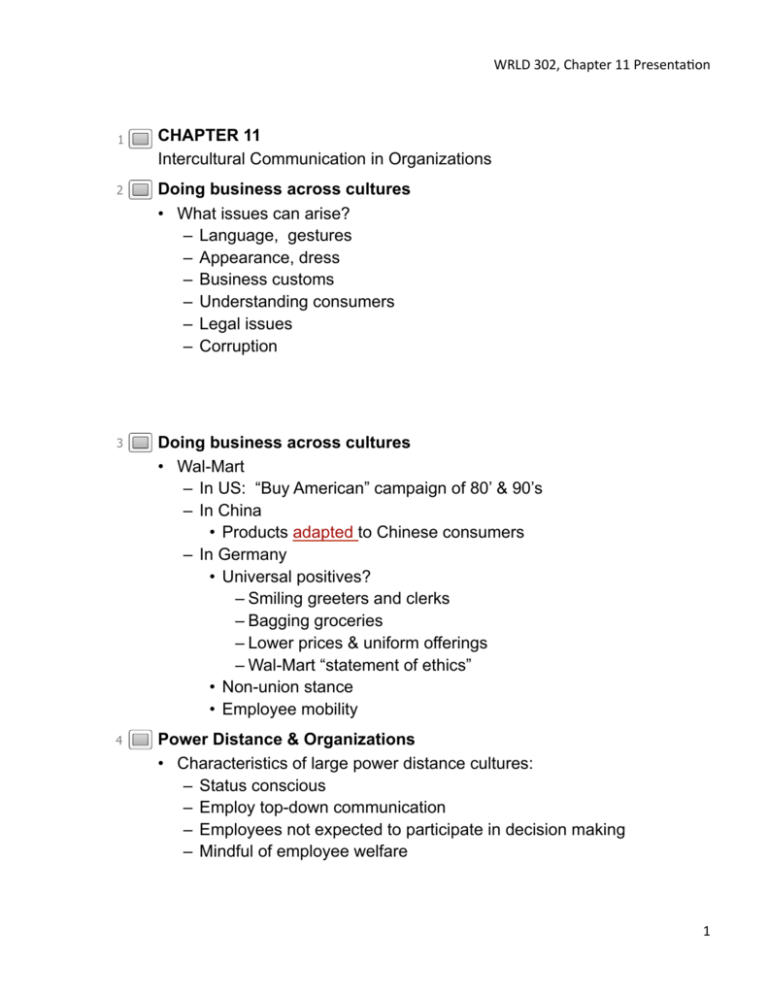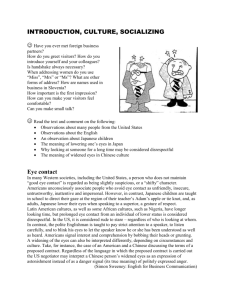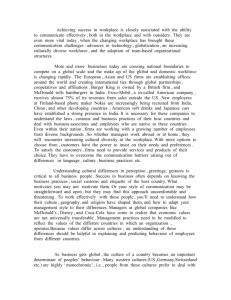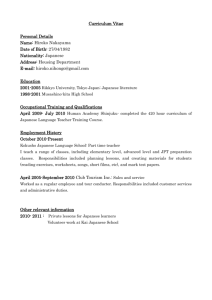CHAPTER 11 Intercultural Communication in Organizations Doing
advertisement

WRLD 302, Chapter 11 Presenta5on 1 CHAPTER 11 Intercultural Communication in Organizations 2 Doing business across cultures • What issues can arise? – Language, gestures – Appearance, dress – Business customs – Understanding consumers – Legal issues – Corruption 3 Doing business across cultures • Wal-Mart – In US: “Buy American” campaign of 80’ & 90’s – In China • Products adapted to Chinese consumers – In Germany • Universal positives? – Smiling greeters and clerks – Bagging groceries – Lower prices & uniform offerings – Wal-Mart “statement of ethics” • Non-union stance • Employee mobility 4 Power Distance & Organizations • Characteristics of large power distance cultures: – Status conscious – Employ top-down communication – Employees not expected to participate in decision making – Mindful of employee welfare 5 Environmental Context • A culture’s perspective on nature often translates into its organizational practices: market control • Concern for environmental issues varies: China 1 4 Power Distance & Organizations • Characteristics of large power distance cultures: – Status conscious WRLD 302, Chapter 11 Presenta5on – Employ top-down communication – Employees not expected to participate in decision making – Mindful of employee welfare 5 Environmental Context • A culture’s perspective on nature often translates into its organizational practices: market control • Concern for environmental issues varies: China • Collectivistic cultures tend to prefer working together in the same physical location • Where physical privacy is not possible (e.g. Korea), psychological privacy is utilized 6 Perceptual Context • Perceptions of American business practices: – Many Muslim countries dislike the US - immoral – Some traditional allies (e.g. Canada) have a low opinion of the U.S. – big brother – Characteristics mentioned in association with the U.S.: greedy, violent, immoral, rude, hardworking, and inventive – Where do such impressions arise • Media • Foreign Policy 7 Socio-Relational Context • Family corporation culture – A metaphor for organizations – Characteristics • Hierarchical – Rewards • Pleasing elders – Sanctions • Loss of affection • Loss of role in the “family” 8 Verbal Communication • Seven deadly sins of Americans’ English causing international misunderstanding: – Local color, slang, officialese/jargon – Humor, vocabulary, grammar • Non-verbal: what issues might arise? – How to dress? – Greetings, shaking hands (how hard) 2 • Pleasing elders – Sanctions • Loss of affection • Loss of role in the “family” WRLD 302, Chapter 11 Presenta5on 8 Verbal Communication • Seven deadly sins of Americans’ English causing international misunderstanding: – Local color, slang, officialese/jargon – Humor, vocabulary, grammar • Non-verbal: what issues might arise? – How to dress? – Greetings, shaking hands (how hard) – Who to greet? In what order? Women? – Proxemics: how close to get, where/when to sit 9 Cultural Aspects of International Business • Comparing business practices in USA and major trading partners – Cultural taxonomies can be a starting point – However, care in lumping countries together: Europe, Asia, Middle East – Importance of culture in doing business internationally => thriving IC training courses • One frequent difference: role of women – More women in power positions: Western Europe • In a number of countries quotas for women on boards, in legislatures • Social benefits that help women work: – child care, extended maternity leave, paternity leave – Most of rest of the world: women less power than USA – Barriers to women: • People like to work with people similar to them, i.e. men hire men • Potential for sexual tension sometimes a concern cited • Concern about management styles 10 Formality of Japanese Business Culture 11 Formality of Japanese Business Culture • Set ritual for exchanging business cards – Hand to partner with slight bow – Receive with both hands and read carefully – Two-sided, for Japanese & English: getting name right • Indicative of more formal Japanese culture • Ritual behavior seen in many aspects of life in Japan • Clash with American-style informality • Verbal/non-verbal: Importance of silence, “hai” • Strong sense of corporate social responsibility 3 10 Formality of Japanese Business Culture 11 Formality of Japanese Business Culture • Set ritual for exchanging business cards WRLD 302, Chapter 11 Presenta5on – Hand to partner with slight bow – Receive with both hands and read carefully – Two-sided, for Japanese & English: getting name right • Indicative of more formal Japanese culture • Ritual behavior seen in many aspects of life in Japan • Clash with American-style informality • Verbal/non-verbal: Importance of silence, “hai” • Strong sense of corporate social responsibility 12 Japanese Management Practices • Business decisions based on benefit to company and to employees • Shushin koyo (lifetime employment) • Nenko joretsu (seniority grading) – Moving toward performance-based evaluation • Taiso (morning exercise) 13 Taiso • Clip from Gung Ho (1986) – Japanese company taking over US auto factory - First day – Japanese business practices face American workers – Point of exercising together • Health of employees a concern for the company (patriarchal attitude) • Team building => strong group coherence • Executives join in => also part of team • Goal: don’t just do your job, think about the good of the company 14 German Management Practices • Individualistic cultures with direct communication style • Facts more important than face • Factual honesty more important than politeness • Compartmentalization (Ordnung muss sein) • Leadership positions awarded with time and experience (practicality) over academic degrees • State-regulated apprentice system => skilled workers 15 German Business Don’ts 16 German Business Don’ts 4 14 German Management Practices • Individualistic cultures with direct communication style • Facts more important than face WRLD 302, Chapter 11 Presenta5on • Factual honesty more important than politeness • Compartmentalization (Ordnung muss sein) • Leadership positions awarded with time and experience (practicality) over academic degrees • State-regulated apprentice system => skilled workers 15 German Business Don’ts 16 German Business Don’ts • Key aspects of German culture important in business – Punctuality - not even 2 minutes late – Formality – Sie/du, get down to business (no jokes or small talk) – Knowledge – they’ve done their homework & expect the same – “Dienst ist Dienst und Schnaps ist Schnaps” • Work at work and have fun when it’s over – Awareness of German culture a plus • More important than speaking the language 17 Mexican Management Practices • Major trading partner – NAFTA • Collectivist culture: Harmony highly valued • View work as a “necessary evil” • Value cooperation over competition – shouldn’t try to stand out • Top positions inherited or acquired through mutual favors/ friendship • Rigid hierarchy • Innovative/risk taking behavior is inappropriate 18 Mexican Business Etiquette 19 Mexican Business Etiquette • Business etiquette – Greetings – depends on context (cf. Germany) – Titles important – Get name right including for women • Start with using family names – Pronunciation of names important • Knowledge of Spanish a plus: English skills vary widely – In contrast to Germans, emotionally expressive style – Closer personal space and touching; strong eye contact 20 Chinese Management Practices • Huge potential market for businesses • Business practices guided by Confucian ideals 5 • Business etiquette – Greetings – depends on context (cf. Germany) – Titles important WRLD 302, Chapter 11 Presenta5on – Get name right including for women • Start with using family names – Pronunciation of names important • Knowledge of Spanish a plus: English skills vary widely – In contrast to Germans, emotionally expressive style – Closer personal space and touching; strong eye contact 20 Chinese Management Practices • Huge potential market for businesses • Business practices guided by Confucian ideals • Relationships viewed as unequal • No separation between social & organizational relationships • Management is responsible for decision making • Organizational conflict dealt with through mediation & compromise • Gift giving – has become a delicate issue 21 Chinese Business Etiquette 22 Chinese Business Etiquette • Expectations from Chinese side – Importance of long term relationships: 系 guān xì – Politeness very important – Handshakes, no bowing – Centrality of 面子 miàn zi (face) – Avoidance of direct statement of opinions, especially negative – Long negotiations typical – Language: usually interpreters are used, but knowing a few phrases in Mandarin a sign of respect 23 Middle East Business Practices • National development and industrialization are top priorities • Growth of economy is rapid • U.S. very unknowledgeable about middle east business practices, including names and titles • Political volatility; large youth population 24 Middle East Business Practices 25 Middle East Business Practices • Do’s and don’ts – Be aware of variety of cultures in Middle East – Some knowledge of Islam helpful – Use culture-appropriate greetings – Don’t ask how his wife is doing • Survey results (Harris & Moran): Arab managers believed that… 6 • U.S. very unknowledgeable about middle east business practices, including names and titles • Political volatility; large youth population WRLD 302, Chapter 11 Presenta5on 24 Middle East Business Practices 25 Middle East Business Practices • Do’s and don’ts – Be aware of variety of cultures in Middle East – Some knowledge of Islam helpful – Use culture-appropriate greetings – Don’t ask how his wife is doing • Survey results (Harris & Moran): Arab managers believed that… – Americans think they are superior. – Americans take credit for everything, even in joint efforts. – Americans do not adjust to or respect the local customs. – Americans refuse to work through normal administrative channels. – Americans lose their democratic ways when working in foreign cultures. 7







